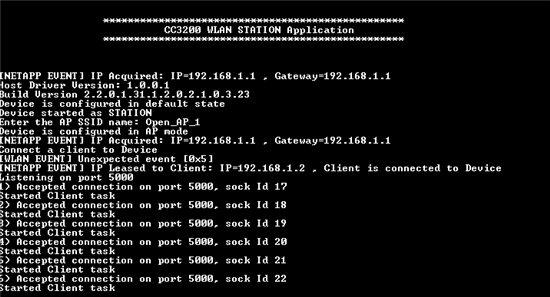Hi Everyone,
How to set up the CC3100 to listen to multiple tcp/ip on a same port?
I did following
1. set the CC3100 to AP mode
2. call sl_Scocket: SockID = sl_Socket(SL_AF_INET,SL_SOCK_STREAM, 0);
3. Status = sl_Bind(SockID, (SlSockAddr_t *)&LocalAddr, AddrSize);
4. Status = sl_Listen(SockID, 0); // _i16 sl_Listen(_i16 sd, _i16 backlog);
I changed the backlog parameter while calling sl_Listen to 5, 8. However, I always got 2 connections.
Here is backlog definition: "The backlog parameter defines the maximum length the queue of pending connections may grow to".
Thanks in advance!


